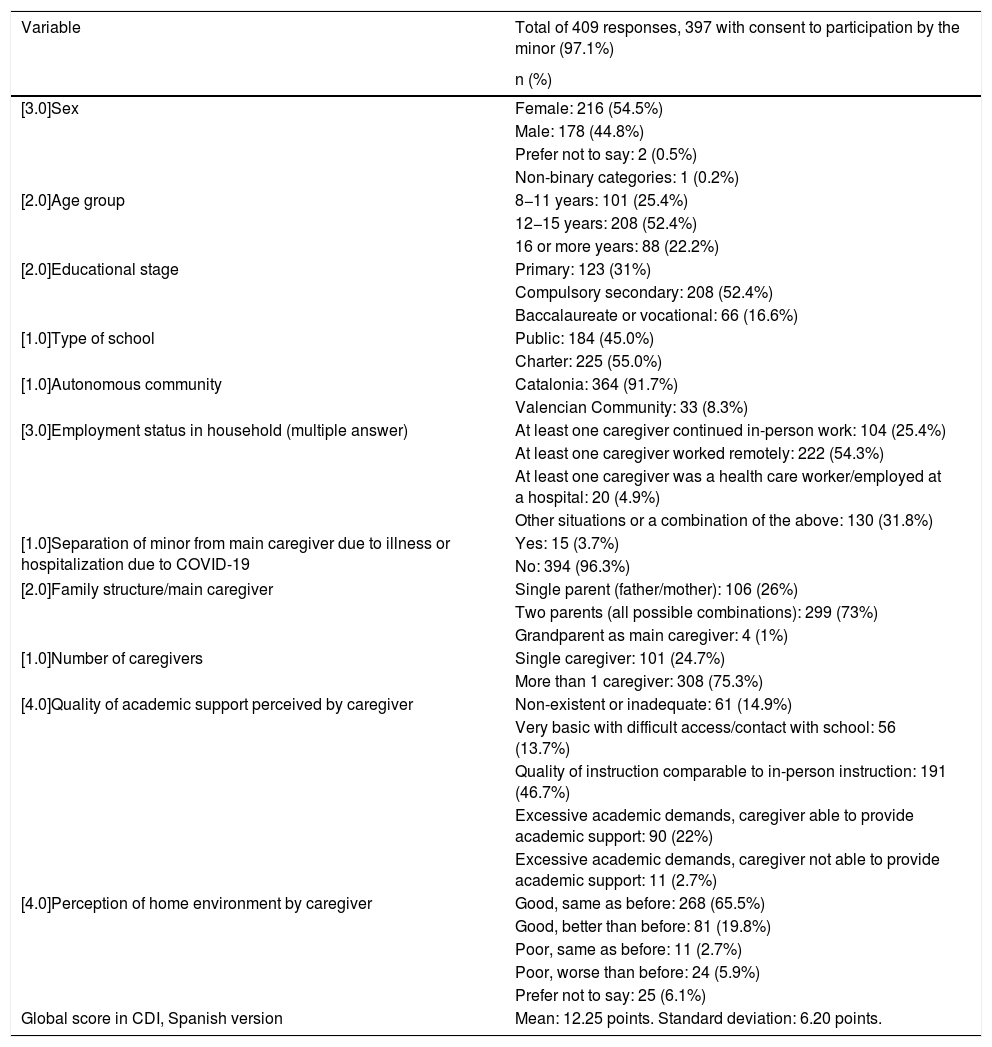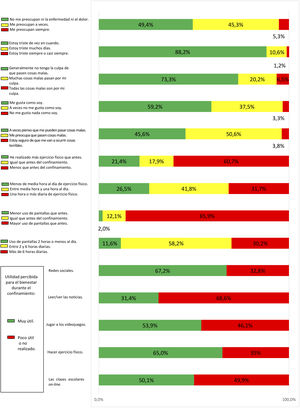On March 14, 2020 the Spanish authorities declared a countrywide state of alert on account of the coronavirus disease 2019 (COVID-19) health crisis, which raised concerns in families, educators and health professionals regarding the potential impact of the situation on the mental health of the paediatric population, and underscoring the need to monitor and investigate this subject.1,2 A survey conducted in the cities of Wuhan and Huangshi in China identified indicators of depression and anxiety in as much as 20% of the child and adolescent population, with less favourable scores in the geographical epicentre of the pandemic.3
We carried out a descriptive study with the aim of identifying children and adolescents at risk of interpersonal problems and depression by means of an instrument applied to a broad bracket of the population (school-aged individuals). To this end, we developed an anonymous data collection form aimed at children and adolescents aged 8–18 years and their caregivers (designed for online completion due to the pandemic, and distributed through electronic email with the help of collaborating schools). The questionnaire comprised 2 parts: the first, to be completed by the adult caregiver, was for collection of demographic data and to obtain informed consent to the minor’s completion of the second part, and the second, to be completed by the dependent, included the items of the Spanish version of Kovacs’ Children’s Depression Inventory (CDI),4 additional questions for the assessment of peer relations based on items from the Cambridge Friendship Questionnaire (CFQ)5 adapted to remote interactions through information and communication technologies (ICTs) and one last section that explored individual and family dynamics during the lockdown. We recruited children and adolescents attending 10 primary and secondary education schools in Catalonia and the Valencian Community between May 11 and June 20, 2020. The study was approved by the Research Ethics Committee of the Hospital Vall d’Hebron in Barcelona.
We obtained a total of 409 responses, of which 97.1% included informed consent to participation by the minors. Overall, 19.2% of minors scored above the threshold established for the likelihood of depression, with a mean score that was consistent with previous data in the Spanish school-age population.4 We found a higher proportion of participants above the threshold in girls, a difference that was statistically significant (23.6% vs 13.0%; P = .009) and also in the group aged 12 or more years (21.7% vs 10.9% in the group under 12 years; P = .018). The results were similar in the subset of participants that lived with a single caregiver during the lockdown (26.0% compared to 16.3% of children with 2 or more caregivers; P = .05). In this context, we ought to highlight that 50.6% of participants reported being worried about pain and disease often or always.
A vast majority of respondents did not identify substantial changes in the quality of peer relationships maintained through ICTs (mean score in the different items, 86.1%; standard deviation, 5). When it came to routines during the lockdown, the salient findings were that 60.7% reported a decrease in physical activity and a substantial proportion (85.9%) reported an increase in screen time compared to previous habits. The main concerns reported by participants were worrying that they or someone close to them could become sick (70.3% of respondents) and not being able to see friends and family (61.5%). Table 1 summarises the characteristics of the sample, and Fig. 1 presents a selection of the most relevant responses.
Sociodemographic characteristics and data of the sample of students and their families.
| Variable | Total of 409 responses, 397 with consent to participation by the minor (97.1%) |
|---|---|
| n (%) | |
| [3.0]Sex | Female: 216 (54.5%) |
| Male: 178 (44.8%) | |
| Prefer not to say: 2 (0.5%) | |
| Non-binary categories: 1 (0.2%) | |
| [2.0]Age group | 8−11 years: 101 (25.4%) |
| 12−15 years: 208 (52.4%) | |
| 16 or more years: 88 (22.2%) | |
| [2.0]Educational stage | Primary: 123 (31%) |
| Compulsory secondary: 208 (52.4%) | |
| Baccalaureate or vocational: 66 (16.6%) | |
| [1.0]Type of school | Public: 184 (45.0%) |
| Charter: 225 (55.0%) | |
| [1.0]Autonomous community | Catalonia: 364 (91.7%) |
| Valencian Community: 33 (8.3%) | |
| [3.0]Employment status in household (multiple answer) | At least one caregiver continued in-person work: 104 (25.4%) |
| At least one caregiver worked remotely: 222 (54.3%) | |
| At least one caregiver was a health care worker/employed at a hospital: 20 (4.9%) | |
| Other situations or a combination of the above: 130 (31.8%) | |
| [1.0]Separation of minor from main caregiver due to illness or hospitalization due to COVID-19 | Yes: 15 (3.7%) |
| No: 394 (96.3%) | |
| [2.0]Family structure/main caregiver | Single parent (father/mother): 106 (26%) |
| Two parents (all possible combinations): 299 (73%) | |
| Grandparent as main caregiver: 4 (1%) | |
| [1.0]Number of caregivers | Single caregiver: 101 (24.7%) |
| More than 1 caregiver: 308 (75.3%) | |
| [4.0]Quality of academic support perceived by caregiver | Non-existent or inadequate: 61 (14.9%) |
| Very basic with difficult access/contact with school: 56 (13.7%) | |
| Quality of instruction comparable to in-person instruction: 191 (46.7%) | |
| Excessive academic demands, caregiver able to provide academic support: 90 (22%) | |
| Excessive academic demands, caregiver not able to provide academic support: 11 (2.7%) | |
| [4.0]Perception of home environment by caregiver | Good, same as before: 268 (65.5%) |
| Good, better than before: 81 (19.8%) | |
| Poor, same as before: 11 (2.7%) | |
| Poor, worse than before: 24 (5.9%) | |
| Prefer not to say: 25 (6.1%) | |
| Global score in CDI, Spanish version | Mean: 12.25 points. Standard deviation: 6.20 points. |
CDI: Children’s Depression Inventory.
In conclusion, the data on depression indicators obtained through the questionnaire did not seem to differ substantially from previously published data in similar populations, despite the complex social and public health situation. The quality of peer relations and other relevant variables did not seem to have deteriorated for respondents during the lockdown. Despite these encouraging data and, since there is still evidence of a subset of the population that is particularly vulnerable to emotional suffering in general and depressive symptoms in particular, even from a very young age,6 we still ought to underscore the need of having a solid and adaptable child and adolescent mental health network.
We ought to highlight that these results have been obtained early in a situation that has turned out to be long-lasting. Therefore, we believe that it is key that paediatricians, teachers and mental health professionals collaborate in the early detection and treatment of mental health disorders that may be related to these exceptional circumstances, or neglected or exacerbated because of them, while also taking the opportunity to learn from this unprecedented and unforeseen situation.
We want to express our gratefulness for the help received to all children, families and teachers of participating schools: Institut Les Corts (Barcelona), Escola Les Corts (Barcelona), Institut Lluís Vives (Barcelona), Institut Montserrat Roig (Barcelona), Colegio Padre Damián-Sagrados Corazones (Barcelona), Escola Joan Pelegrí (Barcelona), Escola Betlem (Premià de Dalt, Barcelona), Institut Pedraforca (l’Hospitalet de Llobregat, Barcelona), CEIP La Marina d’Elx (Elx, Alicante) y CEIP Fadrell (Castelló de la Plana). We also thank Ms Noemí Aznar, Mr Arnau Herrera, Mr Òscar Vila, Dr José Ramón Garcés, Mr Santiago Gil and Dr Núria Wörner for their help in coordinating study activities with participating schools.
Please cite this article as: Castillo-Martínez M, Castillo-Martínez M, Ferrer M, González-Peris S. Depresión infantojuvenil y otros aspectos de salud mental durante el confinamiento y la pandemia por SARS-CoV-2/COVID-19: encuesta en contexto escolar. An Pediatr. 2022;96:61–64.






